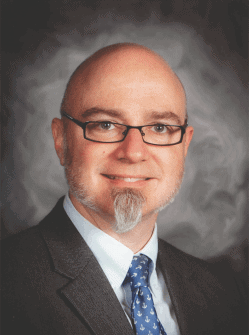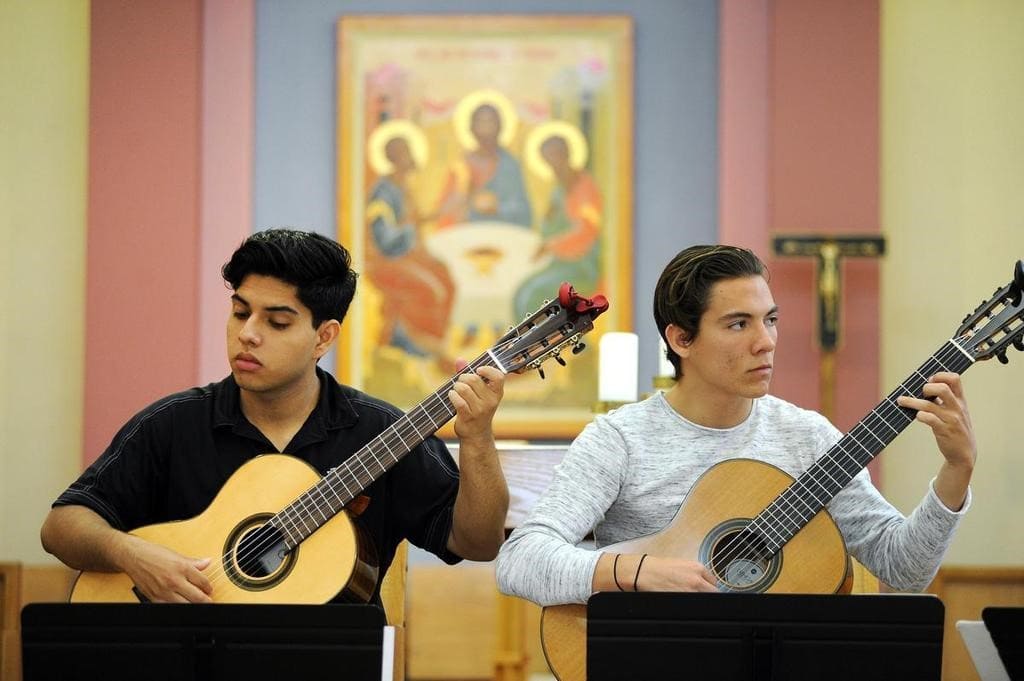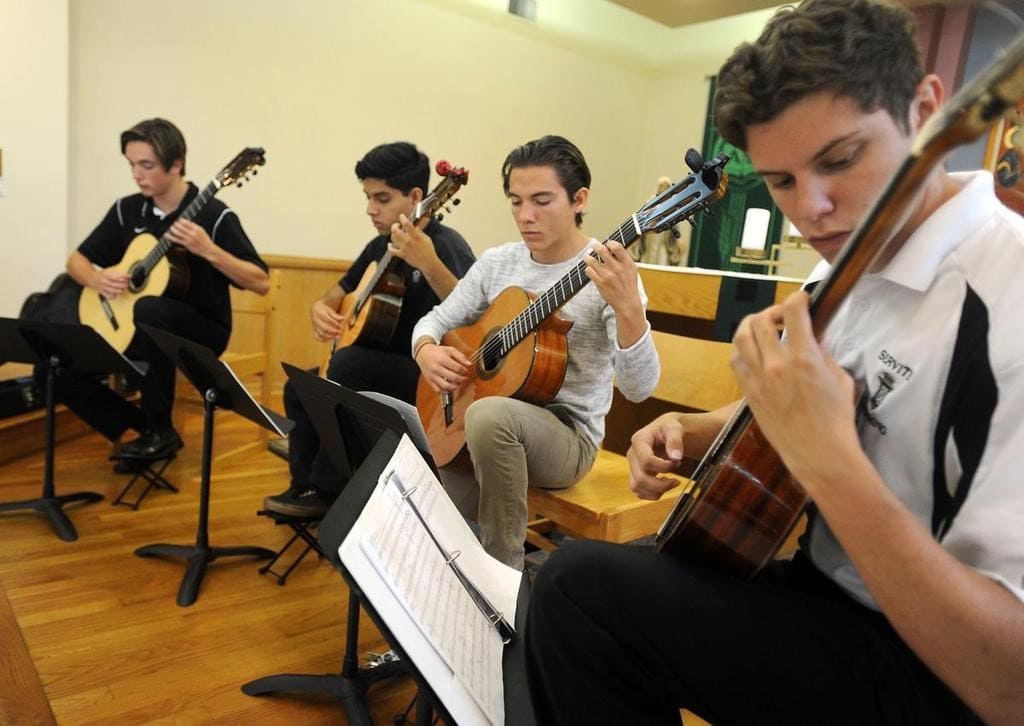/ News Posts / Guitar Class in the Golden State
Guitar Class in the Golden State
Number 17: State of California
By Thomas Amoriello Jr.
NAfME Council for Guitar Education Chair
In 2017, Dr. Andrew Stroud was appointed director of the lauded guitar program at Servite High School in Anaheim, California. Students with no previous experience can take beginning classical guitar to obtain the skills necessary to play the guitar in any style. From there they are prepared to participate in the second through fourth year advanced guitar classes and play in the Servite Guitar Ensembles. Servite guitarists participate in numerous performances throughout the year. There are two concerts, winter and spring, on the Servite campus, the annual Fullerton Museum Center concert, providing music for the Servite Fashion Show, Open House, Mother/Son Brunch, and many others including serving in the role of music ministry for campus Masses.
Talented guest clinicians stop in several times a year, including members of the faculties of Chapman University, The Eastman School of Music, Loyola Marymount University, Cal-State Fullerton, Cal-State Dominguez Hills, UC-Irvine, and Vanguard University. The groups also travel to festivals and workshops both in and outside California. Students have had the chance to work with many well-known and respected artists. The guitar program provides a truly college-prep guitar experience, training students in the skills necessary to take guitar study to the post-secondary level. Whether students desire to study guitar formally in college or not, the Servite guitar experience is a well-rounded guitar experience.
Dr. Stroud began studying the classical guitar with his father while living in Bath, England. He holds a Bachelor of Music degree from Stetson University. He completed both a Master of Music degree and Doctor of Music degrees at Florida State University. Among his other endeavors have been lectures, master classes, and teaching. He has recorded for the Hands-On Teaching method and has authored articles published in Soundboard magazine. As a chamber musician, he has performed in diverse roles ranging from orchestral music to opera. He has been featured on local and national broadcasts on television and NPR. The NAfME Council for Guitar Education would like to thank Andrew for sharing his insight about guitar education with the NAfME membership.
Please tell us about your school and overall music program at Servite High School.
Servite High School is an all-boys, Catholic High School, located in Anaheim, California. The school is operated by the Servite Order, the Servants of Mary. The music program offers Choir, Piano, Concert Band, Jazz Band, and Classical Guitar. The guitar program was founded about 15 years ago, and I currently serve as the instructor. Many of our various ensembles are invited to perform in large festivals each year, and so there are select ensembles that each director operates to serve as examples of high performing student work.
Please tell us about your own personal musical background growing up and your collegiate experience.
I began playing guitar growing up in the United Kingdom (UK), where a standardized Royal Conservatory curriculum is used, and each student must pass grade level exams in order to progress with their musical training. When I moved to the United States, I studied guitar privately with guitarist-composer Thomas Coffey, and then at the university level with Stephen Robinson and Judicael Perroy at Stetson University, and Bruce Holzman at Florida State University. Along the way, I managed to earn several prizes in solo competitions, such as the Columbus State Guitar Symposium, Schadt String Competition, and Rosario Competition, among others. As a soloist, or as a chamber musician with Duo 220, I’ve been lucky enough to play at festivals such as the Texas A&M University Guitar Festival, University of Louisville Guitar Festival, Corsham Festival (UK), Mediterranean Guitar Festival (Italy), Philadelphia Classical Guitar Series, Great Guitarists at Stetson Series, and more. For twelve years, I taught at the university level, and that gave me a great deal of insight into teaching high school students who might desire to study further.
How do the guitar family instruments fit into your teaching?
I utilize only the classical guitar in my teaching currently, though previously I have taught mixed ensembles at universities. Some of these ensembles would utilize bass guitar, electric, or acoustic guitars in combinations with various mixed instrumental ensembles. I find that the classical instrument provides the greatest challenge for musicianship and technique, plus the best and most comprehensive repertoire spanning centuries of musical development.
What obstacles did you face when you were first hired at your school? Now?
I think that moving from the collegiate environment to high school was the biggest challenge, as high school students are incredibly busy in the current moment. Even if a student wants to take extra time to focus on music, their time is highly constrained, and scheduling can be an issue. In addition, the general state of music education and basic music literacy in the K-12 system is rather underdeveloped. Social pressures don’t provide incentives to these students to reflect, or work, in a contemplative fashion, so something as difficult and abstract as music is undervalued.
Furthermore, it’s extremely difficult to direct students to art music. Because of the constant bombardment of popular music, students usually come in with a view of “good music” that needs significant adjustment. Again, this is because music isn’t taught to the degree it should be. Students take English classes throughout their K-12 years, and are at least aware of the differences between literature, and popular fiction. This is a gap from which music education suffers, and so students tend to see art music as a mere reflex indicative of subjective taste, rather than an elevated form of the practice of music. It is highly likely that students enter my classroom able to name no more than three composers (Bach, Beethoven, and Mozart, for those counting), and none for the instrument they are ostensibly there to learn. As a result, many programs are acquiescing to these pressures and teaching popular music increasingly in place of canonical repertoire.
What kind of classes related to the guitar do you teach?
The Servite High School classical guitar program was established about 15 years ago. The program currently offers guitar classes at levels I-IV, with most students who enter at level I doing so with little to no prior experience. Many students, even those at higher levels, do not intend to major in music, but still pursue the guitar to quite a high standard. Other students come to us from charter schools, or magnet performing arts programs, and plan to enter university as performance majors. Some of my students have gone on to study at schools such as Pepperdine University, Loyola-Marymount, University of California, Irvine, Stetson University, and the Cleveland Institute of Music, to name a few.
What would you like to say to the non-guitarist music educator who is about to or interested in incorporating the guitar into their program?
Guitar is an incredibly challenging instrument to master. I’d caution anyone without at least a few years of solid instruction behind them against doing so. If the aim is to learn chords, play accompaniment patterns, or have students perform in popular music ensembles, this is not so challenging. It can be accomplished with a minimum of commitment in time to learning the nuances of the instrument. Playing an instrument without amplification, and with a classical technique, however, is something that needs to be considered with a great deal more weight. The unfortunate reality is that, while high school guitar programs are highly prevalent, many are taught by people who should not be doing so. The students I’ve met at such schools are more than aware of this, and the idea that one can “stay one day ahead” and succeed is simply not true.
Do you have any success stories you would like to share about students (musical and non-musical)?
As mentioned above, many students have gone on to wonderful universities. I think the best moments I can share, however, are those belonging to many students who took guitar level I because they needed to fill a fine arts requirement, but they were soon captivated, and spent four years dedicated to the study of music at the high school level. Whether, or not, these students decide to major in music is largely inconsequential. I think the better outcome is to build an audience for the instrument, and develop a better appreciation among those who would be lifelong enthusiasts, supporting the arts.
What do you tell your talented students who are planning to pursue music or guitar studies in high school or college after they finish with you?
I tell them that it will be the most challenging, and rewarding, experience of their lives to do so. I also tell them that the chances to dive into a field of study in a way that is found on a university campus are rare, and the time spent there is precious. Musicians have a limited window of years to reach their fullest potential on their instrument, and these years cannot be brought back, no matter the fervor.
Music continues to be an extremely competitive field, and so the new student has to find ways to excel in order to prepare for the workplace. The most important tool that a music student can possess is flexibility. They cannot afford to say no to an opportunity, even if it appears banal. While students may have goals for themselves, the path to those goals is often circuitous. The student who implacably decides not to undertake hard work because they can’t foresee how a particular task might benefit them are often those who seldom attain positions post-graduation and are forced out of the field.
Do you have any networking or advocacy tool that have worked for you promoting your program that would help other educators?
Most of the networking that I accomplish is through festivals, societies, and generally being active and supportive in the field. If there is a concert hosted by the local guitar society, I make sure that I go. If my ensemble is invited to perform at a festival or function, I almost always make sure that we are there, and as well prepared as possible.
What kind of future do you see for guitar in music education in the California school system?
I think that more accomplished guitarists will soon be in the school system. With universities facing enrollment challenges and increasingly closing programs, or moving to adjunct instructors, the high school environment will soon be flush with highly educated and competent professional level guitarists, and I hope this leads to a new renaissance for the instrument, and for art music more broadly.
What type of lesson plans have you done for your classes that may be unique?
I don’t think I do anything terribly unique for my classes. I try to make sure that I see every student play every day, even if for a moment. I try to give every student a one-to-one lesson/assessment every week. I also make sure that they learn solo repertoire, technique, and all play in ensembles. We’ve been teaching music for hundreds of years, and I think we have become rather good at it. I’m not sure that there’s some special, novel approach that will distinctly change the way we do things. Even changes that are seen as “groundbreaking” are usually only moving us in small ways. It just so happens that we have become so entrenched in a particular method that incremental changes are perceived as seismic shifts.
Past “Guitar Class in 50 States” articles:
- Number 50: The Granite State (New Hampshire)
- Number 49: The Green Mountain State (Vermont)
- Number 48: The Mountain State (West Virginia)
- Number 47: The Hoosier State (Indiana)
- Number 46: The Mount Rushmore State (South Dakota)
- Number 45: The Pine Tree State (Maine)
- Number 44: The Badger State (Wisconsin)
- Number 43: The Constitution State (Connecticut)
- Number 42: The Evergreen State (Washington)
- Number 41: The Pelican State (Louisiana)
- Number 40: The Beaver State (Oregon)
- Number 39: The Equality State (Wyoming)
- Number 38: The Empire State (New York)
- Number 37: The Old Line State (Maryland)
- Number 36: The Centennial State (Colorado)
- Number 35: The Bay State (Massachusetts)
- Number 34: The Sooner State (Oklahoma)
- Number 33: The Prairie State (Illinois)
- Number 32: The Hawkeye State (Iowa)
- Number 31: The Volunteer State (Tennessee)
- Number 30: The Palmetto State (South Carolina)
- Number 29: The Natural State (Arkansas)
- Number 28: The Tar Heel State (North Carolina)
- Number 27: The Magnolia State (Mississippi)
- Number 26: The Peace Garden State (North Dakota)
- Number 25: The Treasure State (Montana)
- Number 24: The First State (Delaware)
- Number 23: The Buckeye State (Ohio)
- Number 22: The Yellowhammer State (Alabama)
- Number 21: The Sunflower State (Kansas)
- Number 20: The Great Lakes State (Michigan)
- Number 19: The Lone Star State (Texas)
- Number 18: The Bluegrass State (Kentucky)
- Number 16: The Show-Me State (Missouri)
- Number 15: The Keystone State (Pennsylvania)
- Number 14: The Last Frontier State (Alaska)
- Number 13: The Beehive State (Utah)
- Number 12: The Peach State (Georgia)
- Number 11: The Cornhusker State (Nebraska)
- Number 10: The Gem State (Idaho)
- Number 9: The Old Dominion (Virginia)
- Number 8: The Aloha State (Hawaii)
- Number 7: The Land of Enchantment (New Mexico)
- Number 6: The Sunshine State (Florida)
- Number 5: The Grand Canyon State (Arizona)
- Number 4: The Ocean State (Rhode Island)
- Number 3: The North Star State (Minnesota)
- Number 2: The Silver State (Nevada)
- Number 1: The Garden State (New Jersey)
About the author:
 Thomas Amoriello Jr. serves as the chair on the NAfME Council for Guitar Education and is also the Chairperson for the New Jersey Music Education Association. Tom has taught guitar classes for the Flemington Raritan School District in Flemington, New Jersey, since 2005 and was also an adjunct guitar instructor at Cumberland County College, New Jersey, for five years. He has earned a Master of Music Degree in Classical Guitar Performance from Shenandoah Conservatory and a Bachelor of Arts in Music from Rowan University. He is the author of the children’s picture books A Journey to Guitarland with Maestro Armadillo and Ukulele Sam Strums in the Sand, both available from Black Rose Writing. He recently made a heavy metal recording with a stellar roster of musicians including former members of Black Sabbath, Whitesnake, Ozzy Osbourne, Yngwie J. Malmsteen’s Rising Force, and Dio that was released on H42 Records of Hamburg, Germany. The record released on 12-inch vinyl and digital platforms has received favorable reviews in many European rock magazines and appeared on the 2018 Top 15 Metal Albums list by Los Angeles KNAC Radio (Contributor Dr. Metal). Visit thomasamoriello.com for more information.
Thomas Amoriello Jr. serves as the chair on the NAfME Council for Guitar Education and is also the Chairperson for the New Jersey Music Education Association. Tom has taught guitar classes for the Flemington Raritan School District in Flemington, New Jersey, since 2005 and was also an adjunct guitar instructor at Cumberland County College, New Jersey, for five years. He has earned a Master of Music Degree in Classical Guitar Performance from Shenandoah Conservatory and a Bachelor of Arts in Music from Rowan University. He is the author of the children’s picture books A Journey to Guitarland with Maestro Armadillo and Ukulele Sam Strums in the Sand, both available from Black Rose Writing. He recently made a heavy metal recording with a stellar roster of musicians including former members of Black Sabbath, Whitesnake, Ozzy Osbourne, Yngwie J. Malmsteen’s Rising Force, and Dio that was released on H42 Records of Hamburg, Germany. The record released on 12-inch vinyl and digital platforms has received favorable reviews in many European rock magazines and appeared on the 2018 Top 15 Metal Albums list by Los Angeles KNAC Radio (Contributor Dr. Metal). Visit thomasamoriello.com for more information.
Interested in reprinting this article? Please review the reprint guidelines.
The National Association for Music Education (NAfME) provides a number of forums for the sharing of information and opinion, including blogs and postings on our website, articles and columns in our magazines and journals, and postings to our Amplify member portal. Unless specifically noted, the views expressed in these media do not necessarily represent the policy or views of the Association, its officers, or its employees.
Catherina Hurlburt, Marketing Communications Manager. May 30, 2019. © National Association for Music Education (NAfME.org)
Published Date
May 30, 2019
Category
- Ensembles
Copyright
May 30, 2019. © National Association for Music Education (NAfME.org)









